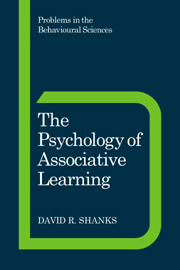Crossref Citations
This Book has been
cited by the following publications. This list is generated based on data provided by Crossref.
Mackintosh, N.J.
1997.
Has the Wheel Turned Full Circle? Fifty Years of Learning Theory, 1946–1996.
The Quarterly Journal of Experimental Psychology Section A,
Vol. 50,
Issue. 4,
p.
879.
Shanks, David R.
Johnstone, Theresa
and
Staggs, Leo
1997.
Abstraction Processes in Artificial Grammar Learning.
The Quarterly Journal of Experimental Psychology Section A,
Vol. 50,
Issue. 1,
p.
216.
Richard, Francis D.
and
McGahan, Joseph R.
1998.
An Evaluation of the Conditional Probability Strategy and Rule-Analysis Methodology in Judgments of Covariation.
Psychological Reports,
Vol. 82,
Issue. 3,
p.
819.
White, Peter A.
1998.
Causal Judgement: Use of Different Types of Contingency Information as Confirmatory and Disconfirmatory.
European Journal of Cognitive Psychology,
Vol. 10,
Issue. 2,
p.
131.
Strange, B. A.
Fletcher, P. C.
Henson, R. N. A.
Friston, K. J.
and
Dolan, R. J.
1999.
Segregating the functions of human hippocampus.
Proceedings of the National Academy of Sciences,
Vol. 96,
Issue. 7,
p.
4034.
Sánchez-Moreno, J.
Rodrigo, T.
Chamizo, V. D.
and
Mackintosh, N. J.
1999.
Overshadowing in the spatial domain.
Animal Learning & Behavior,
Vol. 27,
Issue. 4,
p.
391.
White, Peter A.
2000.
Causal judgment from contingency information: Relation between subjective reports and individual tendencies in judgment.
Memory & Cognition,
Vol. 28,
Issue. 3,
p.
415.
Vallee-Tourangeau, Frederic
Beynon, David M.
and
James, Staunton A.
2000.
The role of alternative hypotheses in the integration of evidence that disconfirms an acquired belief.
European Journal of Cognitive Psychology,
Vol. 12,
Issue. 1,
p.
107.
Howard, Robert W.
2000.
Generalization and Transfer: An Interrelation of Paradigms and a Taxonomy of Knowledge Extension Processes.
Review of General Psychology,
Vol. 4,
Issue. 3,
p.
211.
Clariana, Roy B.
Wagner, Daren
and
Roher Murphy, Lucia C.
2000.
Applying a connectionist description of feedback timing.
Educational Technology Research and Development,
Vol. 48,
Issue. 3,
p.
5.
Hoffmann, Joachim
and
Stock, Armin
2000.
Intention als psychischer Prozess: Eine Suche nach Spuren in der allgemeinpsychologischen Forschung* * Wir danken Klaus Foppa und Friedhart Klix für konstruktive Anmerkungen zum Manuskript..
Zeitschrift für Psychologie / Journal of Psychology,
Vol. 208,
Issue. 3-4,
p.
304.
Hoffmann, Joachim
and
Sebald, Albrecht
2000.
Lernmechanismen zum Erwerb verhaltenssteuernden Wissens.
Psychologische Rundschau,
Vol. 51,
Issue. 1,
p.
1.
Delamater, Andrew R.
and
Joseph, Pearl
2000.
Common coding in symbolic matching tasks with humans: Training with a common consequence or antecedent.
The Quarterly Journal of Experimental Psychology Section B,
Vol. 53,
Issue. 3b,
p.
255.
Savage, Tony
and
Ziemke, Tom
2000.
Learning and Unlearning Mechanisms in Animats and Animals.
Adaptive Behavior,
Vol. 8,
Issue. 2,
p.
97.
White, Peter A.
2001.
Causal judgments about relations between multilevel variables..
Journal of Experimental Psychology: Learning, Memory, and Cognition,
Vol. 27,
Issue. 2,
p.
499.
Fletcher, P. C.
Anderson, J. M.
Shanks, D. R.
Honey, R.
Carpenter, T. A.
Donovan, T.
Papadakis, N.
and
Bullmore, E. T.
2001.
Responses of human frontal cortex to surprising events are predicted by formal associative learning theory.
Nature Neuroscience,
Vol. 4,
Issue. 10,
p.
1043.
Ptak, Radek
Gutbrod, Klemens
Perrig, Walter
and
Schnider, Armin
2001.
Probabilistic contingency learning with limbic or prefrontal damage..
Behavioral Neuroscience,
Vol. 115,
Issue. 5,
p.
993.
2001.
The Cambridge Handbook of Computational Psychology.
p.
187.
López, Francisco J.
and
Shanks, David R.
2001.
The Cambridge Handbook of Computational Psychology.
p.
589.
Wilson, Paul N.
2002.
Elemental versus configurai models of categorization in children and adults.
Current Psychology,
Vol. 21,
Issue. 2,
p.
199.



